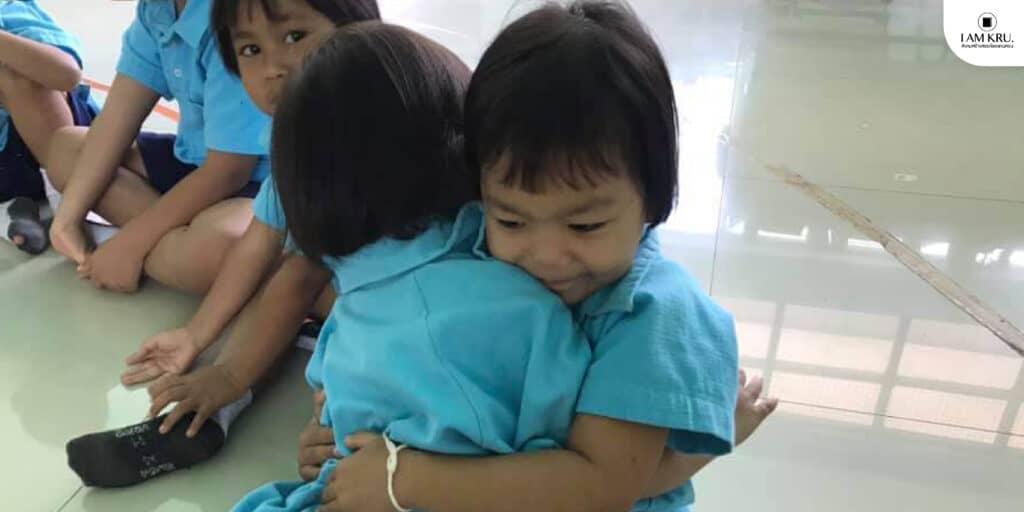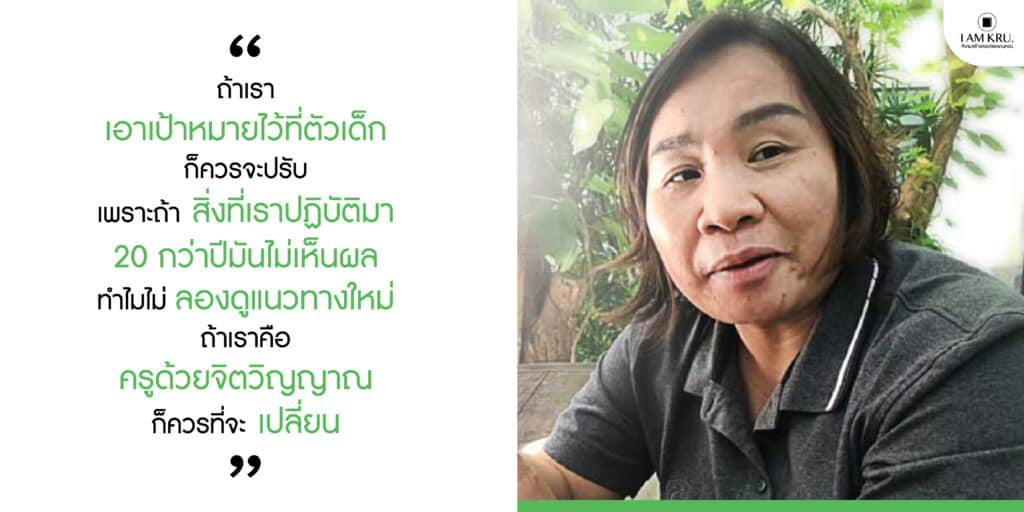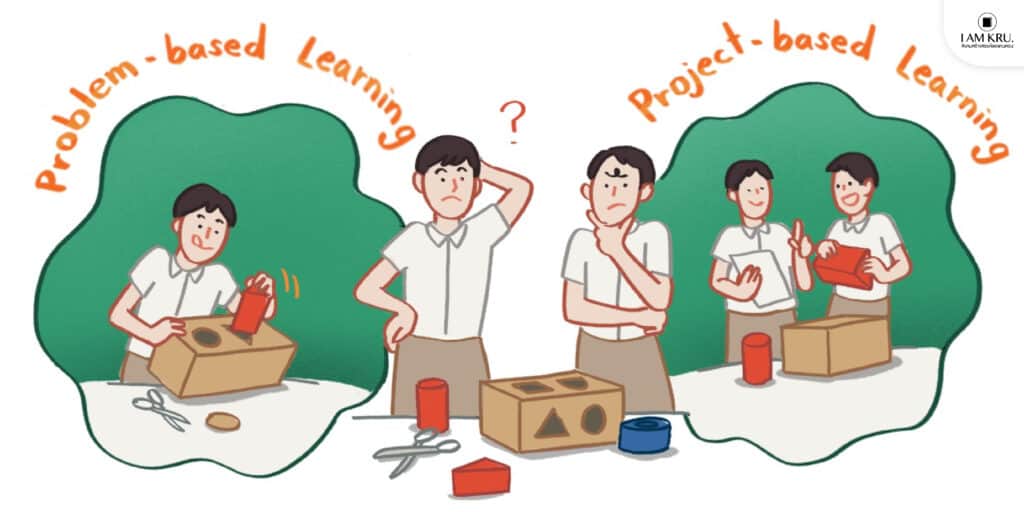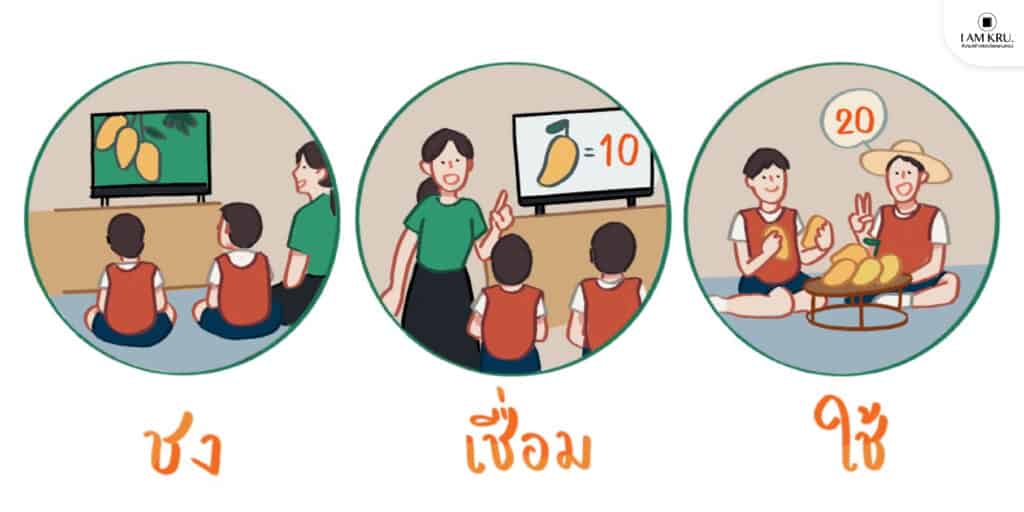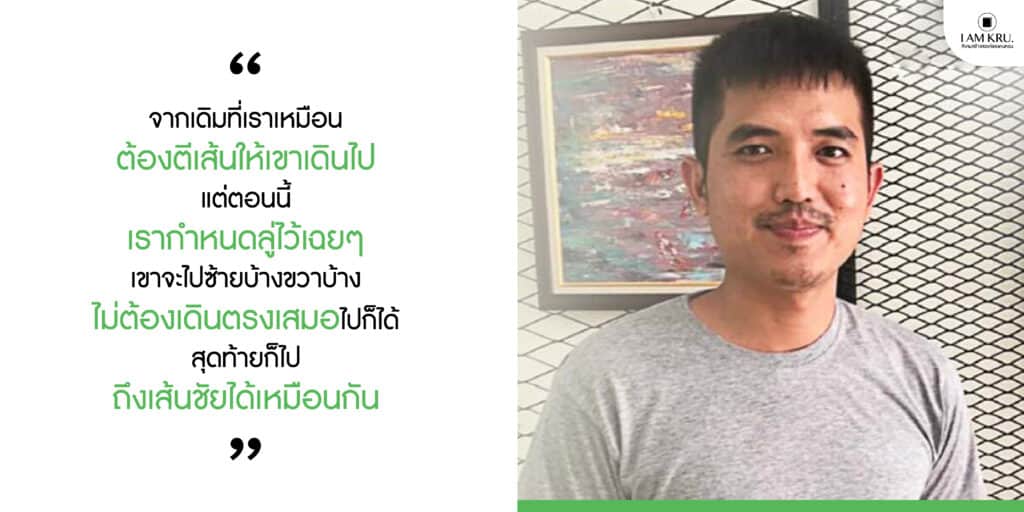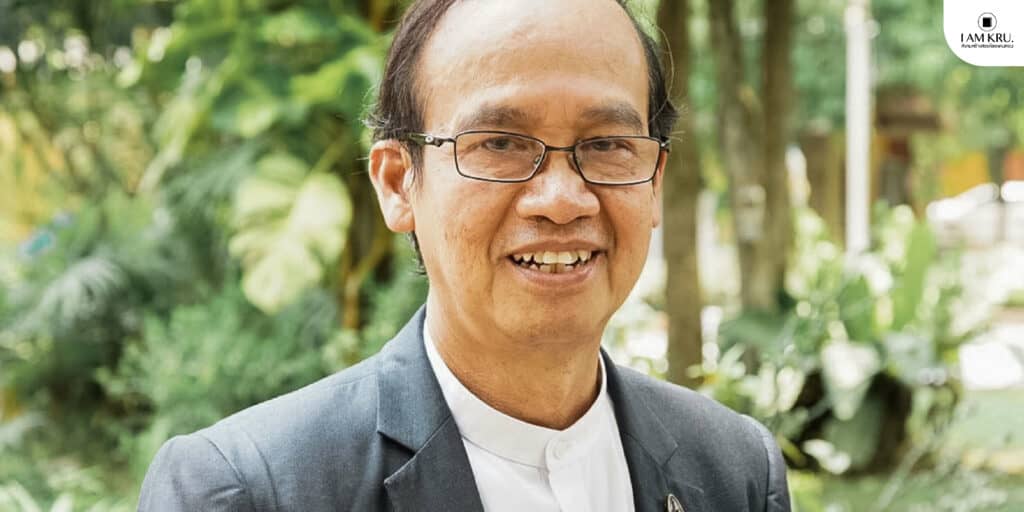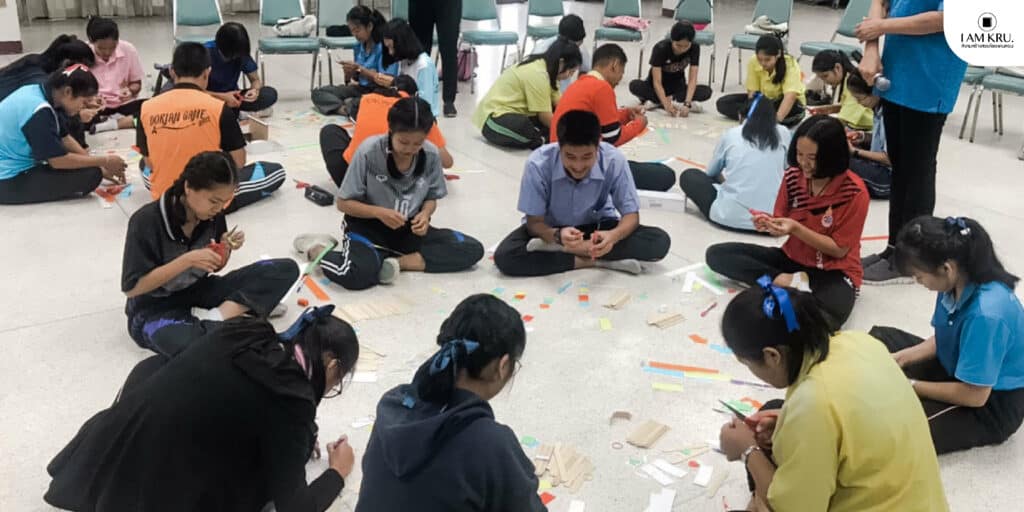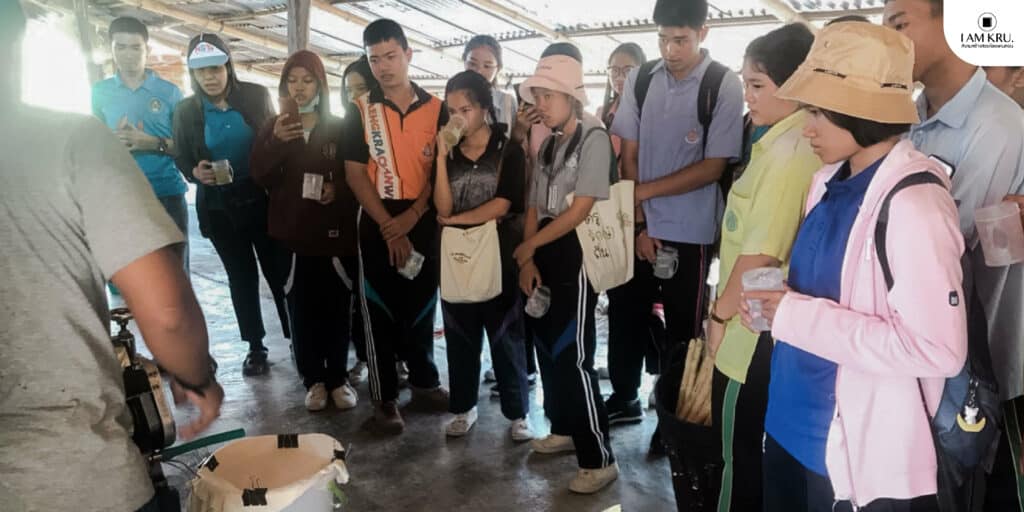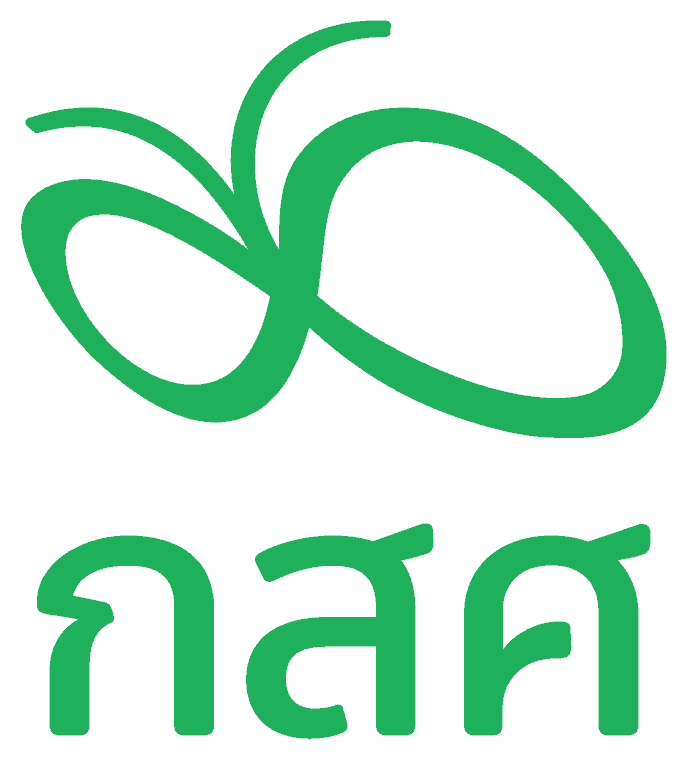“The strength of this program that has witnessed an obvious change in students and teachers is the use of positive psychology to motivate them to come to school.” Pichet Srirawatra, director of Ban Pho En school , Kamphaeng Phet province.
Which educational method would motivate students to develop themselves and motivate teachers to understand their students better?
The Equitable Education Fund (EEF) has been working on the Teacher School Quality Program (TSQP) which aims to change the whole school approach, including changing old teaching methods into an interesting and effective one and developing schools’ management in target provinces. The program has reached its second generation with 45 schools in 4 provinces, Phitsanulok, Phetchabun, Kamphaeng Phet, and Nakhon Sawan.
Other interesting facts are how TSQP and its alliances develop their teaching method and school management, and how they evaluate students’ academic performance, teaching method, and systematic school management.
Good Cooperation is key to success
The TSQP 2nd generation has cooperated with Naresuan University to determine the direction of management and education of various schools in form of the whole school approach, including determining the goal of each school, developing information system and applying it to the Q-info system, developing teachers and executives using PLC, building a network, promoting active learning, providing a guideline to adjust teaching method and a guideline to take care of underprivileged children, and funding 45 different schools.
Asst. Prof. Dr. Anucha Kornpuang, Deputy Dean of Administrative and Development section, Faculty of Education, Naresuan University, said that the university has held an activity according to the implementation plan to 45 target schools’ executives, teachers and stakeholders such as affiliation’s representatives, students’ families and community, in order to provide an understanding of direction and competency of this program to teachers and people involved such as parents and the community and promote cooperation to achieve the goal.
Naresuan University has formed the ‘central coach’ team to plan the implementation from operating the “main course” for teacher training and others. The central coach consists of facilitators from the Faculty of Education and the experts such as personnel from the TSQP 1st generation in association with Lamplaimat Pattana Foundation, educational service area executives, experienced supervisors. Also, there are ‘local coaches’ which are school supervisors and university lecturers, divided into 4 teams These 4 teams will be assigned to supervise in 4 different provinces. Coaches from the central coach team will join local coaches in a monthly area survey in which they would get an insight and a problem-solving guideline from holding monthly meetings.
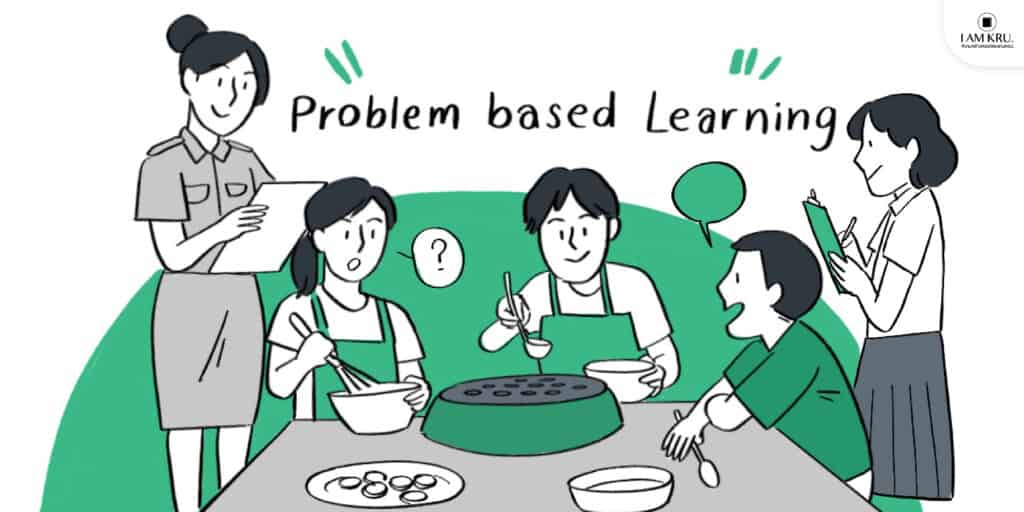
Penpan Chittasnee, TSQP manager, said that this program has been operating for 1 academic semester now. The structure of the school working process was interrupted during the COVID-19 due to the inconvenience of visiting schools in the area. The zoom meeting was employed instead to study the whole school approach and track the process of each school which is considered to be an adaptation to the pandemic and proof of efficient remote working.
Learn from the problem and place students at the center
TSQP and Naresuan University heavily emphasize learning management as it is associated most with students. In the 2nd generation, Naresuan University suggested learning management in a form of Active Learning (AL) and Problem-based Learning (PBL) to the executives and teachers in each school so they could decide which form would suit their students. Active learning is a learning method in which students are involved in the course through practicing or exercising problem-solving skills from a real-life situation. This method will make students with low academic achievement focus on the lesson again.
The Problem-based Learning method would fit perfectly for schools looking to provide critical thinking skills for their students. Both of them are student-centric.
Asst. Prof. Dr. Anucha has explained further that schools in Phetchabun and Nakhon Sawan are using a mixed teaching method of AL and PBL, and most schools in the municipality’s supervision are using AL due to policy associated with local administration. Nonetheless, 80 percent of all schools prefer PBL which aims to develop competency as a whole.
The satisfactory outcome of local schools
According to the outcome of operating this program for 1 semester, Asst. Prof. Anucha found that the outstanding schools with determined school executives are Wat Ban Mung School, Ban Khao Cha Ngok School, and Ban Pho En School.
Acting Sub Lt. Somsak Lamai, Wat Ban Mung School director in Nakhon Sawan, said that the school chose the PBL learning method due to the goal of this school which aims for children to be “a good citizen of the society by having good teacher, good children, and happiness for all”. The school came to a mutual understanding with the parents in order to give them an illustration of the PBL method, the parents got to take part in the activity as well as the meetings with the school board in determining and approving of the PBL activity.
“Parents are admitted to this program because ‘children are important to the future of this country. Therefore, making a decision that would affect them does not have to wait. In these past 2-3 months, we have received overwhelming support from the parents. If there are any suggestions, we are more than welcome to take them into consideration for the benefit of our children.”
Rungnapa Iam–orn, a teacher at Wat Ban Mung School in Nakhon Sawan, said that the operation with Naresuan University has improved teachers and students for the better. The students show appropriate behavior and are able to apply critical thinking and experiences from self–learning to solve problems. All things considered, Ms. Iam-orn decided to keep operating this program. The school will be able to operate by itself in the future without help from the university because the local coaches have provided basic knowledge for teachers to be able to guide their students.
The most important thing rather than students getting to learn is that the teachers get to learn about their students.
Mr. Khum Saengchan, a director at Ban Khao Cha Ngok school in the TSQP program, said “the original teaching method has no longer competent for the new generation kids as the world is constantly changed, so the teacher has to come up with modern and effective teaching method that corresponds with the world today”.
He also suggested that an authentic vision of the school was unsuitable for the new concept of learning, so he decided to change the original version. However, in order to meet the National Education Act of Thailand standard, he and the core faculty initiated the new school vision and mission statement, including setting new goals for school and adding the integration program, AL, and PBL learning to academic courses during the afternoon session. In addition, developing the entire school system, every step-by-step needed to be presented to the Board of Education and parents.
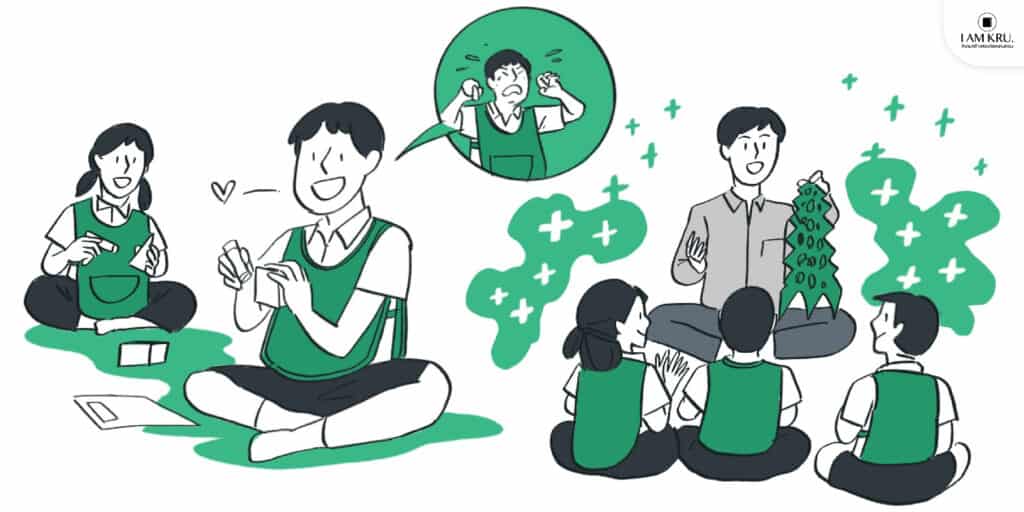
Positive psychology enhances learning environment
The new concept of learning is to use positive psychology along with teaching by creating a “positive force field” in the school. Mr. Khum mentioned that he used to be a very strict teacher who always applied rigid rules to teach his students. Now, he turned to ‘positive psychology’ as a way to encourage his students’ performance, and eventually, they have improved.
Mr. Khum said that the outcome of applying positive psychology to the process is satisfactory because the courses are categorized into main and integrated courses. Some students struggled with a long and difficult lesson but they have significantly improved during the integrated course, they are happier and able to make a decent piece of work. Part of this has to do with encouragement from the teacher. Applying AL and PBL can support studying in the main course and encourage students; they would feel safe and able to further develop themselves academically in the future. Whether other schools are applying PBL, AL, or a mixed-method, positive psychology should be integrated as well.
Mr. Pichet Srirawat, a director at Ban Pho En school in Kamphaeng Phet which is currently a member of the second generation TSQP program, said that applying PBL and positive psychology to teaching methods has greatly improved his students. Students started to develop their perspective and came up with ideas to develop the whole school approach. They get to present their piece of work and are happy with what they do. Teachers will have more workload because they need to change their teaching style; no more textbook-based approach, no more complaining, scolding, and other negative act on students. For the school’s operational plan, teachers will be divided into 4 groups and work together. The 4 groups are kindergarten teachers, level 1 teachers (1st – 3rd grade), level 2 teachers (4th grade – 6th grade), and, the biggest group, every teacher in school. They will plan out the integrated course in each week, both physical and virtual. The process took some time in the beginning because half of the teachers are elders, they need to support one another but they are happy. If teachers are able to adapt, employing PBL and positive psychology in the teaching method would be easier.
“The significant change of this program that witness a better change in teachers and students is due to applying positive psychology as a tool to help the students, making them want to participate in class every day. One example is a grade 5 student who used to cry every day and was always tardy. After applying PBL to the teaching method, this student became a leading student in class because he wanted to have fun. He wanted to come to school early every day, and he never cry again. This clearly affected the student’s supervision.” Mr. Pichet said.
As for improving the classroom pattern to become the growing classroom, the TSQP and its staff see the opportunity to improve this process for the better. Therefore, the schools need to wholly dedicate themselves to the students, being student-centered and aiming to achieve further. AL, PBL, and positive psychology are basic tools of the classroom that teachers can endlessly add other lessons into it. The more important thing is adjusting the lesson that would suit each age range in order to help students think, act, be themselves, and be happy every day at school.
431
Writer

- เอื้อการย์ โรจนจิรไพศาล (มะแม้ว)
- นักเขียนผู้หลงรักการผจญภัยในเมือง ปรัชญาในชีวิตจริง และการไป Cafe Hopping ทั่วทุกมุมเมือง
